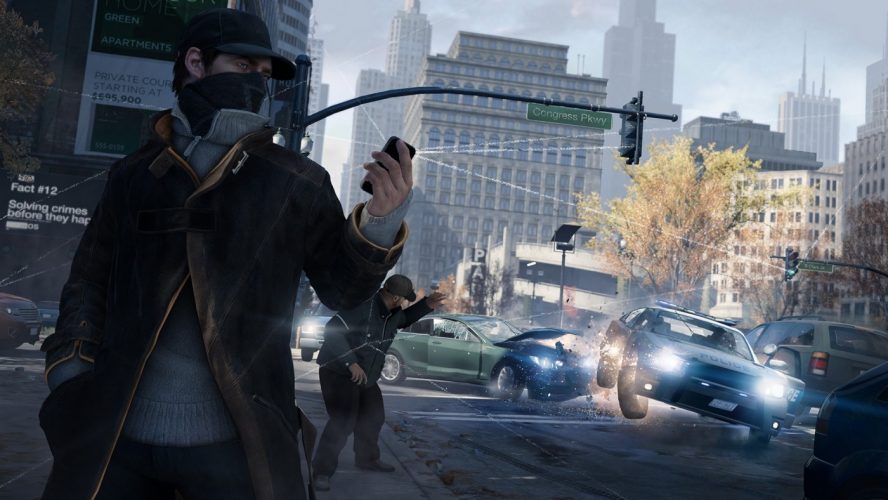I’ve made my stance on open-world games clear in a previous review. There needs to be something special about the game, some kind of X-factor, that will pique my interest in it. InFAMOUS: Second Son accomplished that with superhuman powers, while WATCH_DOGS claims to offer something completely different, with an emphasis on hacking and an unprecedented ability to manipulate the environment to the player’s advantage.
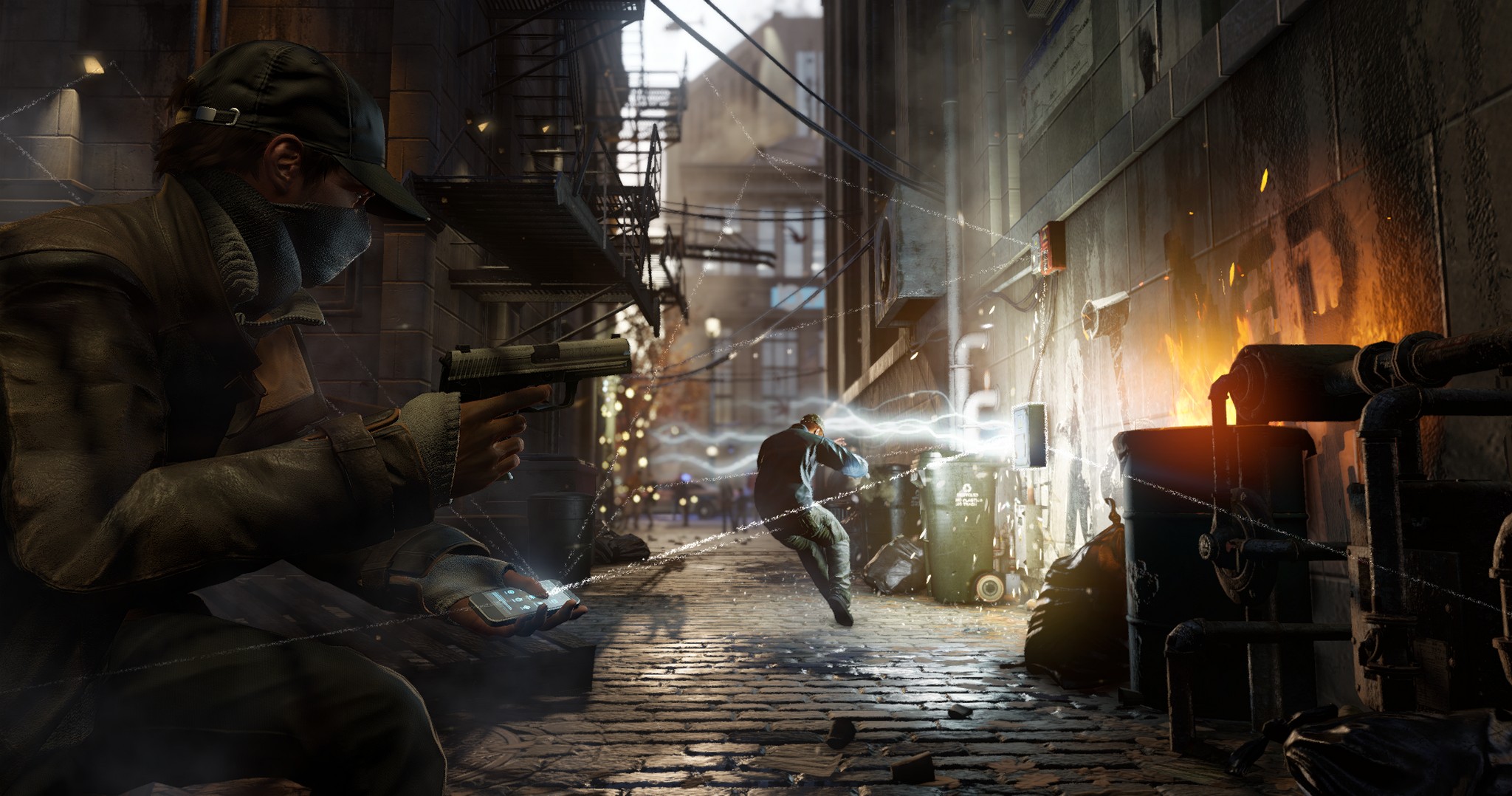 As any discerning gamer knows, the internet hype machine tends to blow things way out of proportion, hailing every major AAA release as “revolutionary” and “the next big thing”. Nevertheless, I was intrigued, and I approached Ubisoft’s latest blockbuster offering with a healthy amount of skepticism mixed with excitement.
As any discerning gamer knows, the internet hype machine tends to blow things way out of proportion, hailing every major AAA release as “revolutionary” and “the next big thing”. Nevertheless, I was intrigued, and I approached Ubisoft’s latest blockbuster offering with a healthy amount of skepticism mixed with excitement.
WATCH_DOGS is quite the strange beast: an all-too-familiar tale of revenge set among warring gangs and hacker collectives against the backdrop of the city of Chicago, now run by the virtually omniscient ctOS supercomputer. In a post 9-11 world rocked by one surveillance scandal after another, does WATCH_DOGS‘ unique premise elevate it beyond other open-world games, or does it buckle under the weight of it’s own gimmick?
Anonymous Does Not Forgive
You play the role of Aiden Pearce, a hacker involved in an electronic robbery that goes awry. Without going into too much detail, the following events result in Aiden having his cover blown and subsequently leads to the death of his niece during a botched assassination attempt. The game picks up a year after the incident, with an estranged Aiden seeking vengeance against the ones responsible for the tragedy.
 Right off the bat, the game displays a serious identity crisis. It’s quite the stretch to label Aiden as a hacker; he comes across as more Jason Bourne than Jeff Goldblum’s character in Independence Day. Over the course of the game, Aiden routinely engages in firefights, physical altercations, and car chases, taking down villains and criminals in direct, up-close fashion as a vigilante.
Right off the bat, the game displays a serious identity crisis. It’s quite the stretch to label Aiden as a hacker; he comes across as more Jason Bourne than Jeff Goldblum’s character in Independence Day. Over the course of the game, Aiden routinely engages in firefights, physical altercations, and car chases, taking down villains and criminals in direct, up-close fashion as a vigilante.
In fact, the very first available action that the player takes in WATCH_DOGS is to shoot someone, followed immediately by a physical takedown (albeit a non-lethal one). As Kirk Hamilton from Kotaku similarly notes, this is a terrible way to kick off a game where we’ve been told time and time again that hacking is supposed to be the primary focus.
Such confrontational acts of violence run contrary to WATCH_DOGS‘ central theme, and at times I felt more like the Punisher instead of some master hacker. I partly attribute that to the character of Aiden himself. The man is rather unlikeable and has the personality of a gruff, battle-worn “tough guy” you’ve seen a million times over in military shooters.
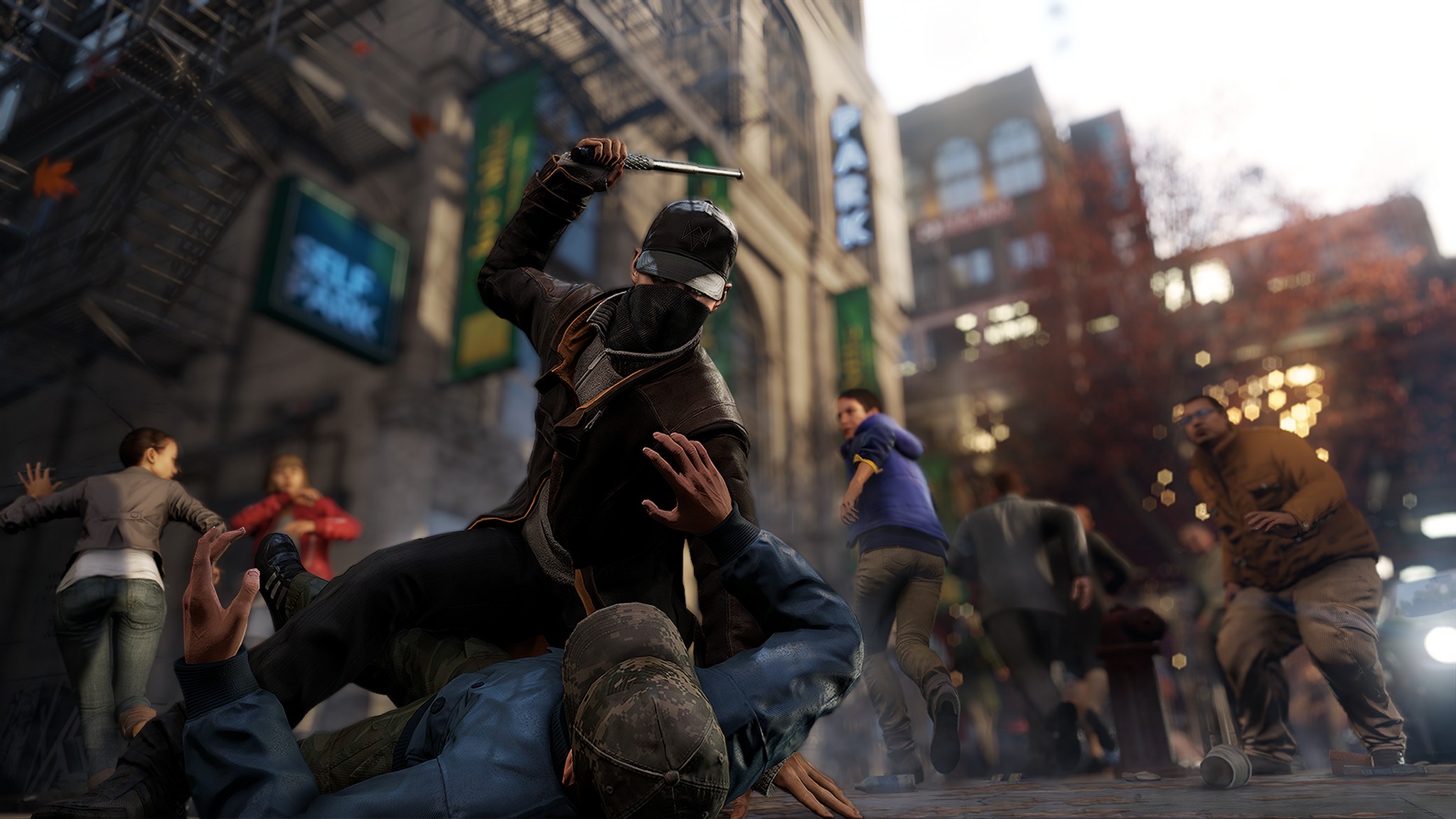 While I applaud Ubisoft for not portraying hackers as stereotypical overweight, glasses-wearing, basement-dwelling neckbeards, they have clearly swung all the way to the other end of the spectrum and made Aiden your “dudebro” archetype protagonist, with the bonus tragic bit of history thrown in for good measure alongside his physicality.
While I applaud Ubisoft for not portraying hackers as stereotypical overweight, glasses-wearing, basement-dwelling neckbeards, they have clearly swung all the way to the other end of the spectrum and made Aiden your “dudebro” archetype protagonist, with the bonus tragic bit of history thrown in for good measure alongside his physicality.
By the end of the game, I wouldn’t have batted an eyelid if there was a scene of Aiden emptying his weapon into a bad guy while screaming “MY NIECE IS DEEEAAAD” in a rough, gravelly voice. Ubisoft has always been pretty hit-and-miss with regards to their protagonists, and for every Ezio Auditore, there is a Connor Kenway. No prize for guessing who Aiden Pearce leans towards in terms of likeability.
Welcome to Hack-A-Shack
But enough about Aiden. Let’s talk about hacking. Remember, that big fat hook WATCH_DOGS has that’s supposed to set it apart from other open-world games out there?
Hacking definitely works, though it is not really as groundbreaking as Ubisoft’s marketing team would like you to believe. At it’s core, hacking is essentially another avenue of environmental interaction, albeit on a larger scale (sometimes) and triggered remotely through your ever-present smartphone that miraculously never runs out of battery power.
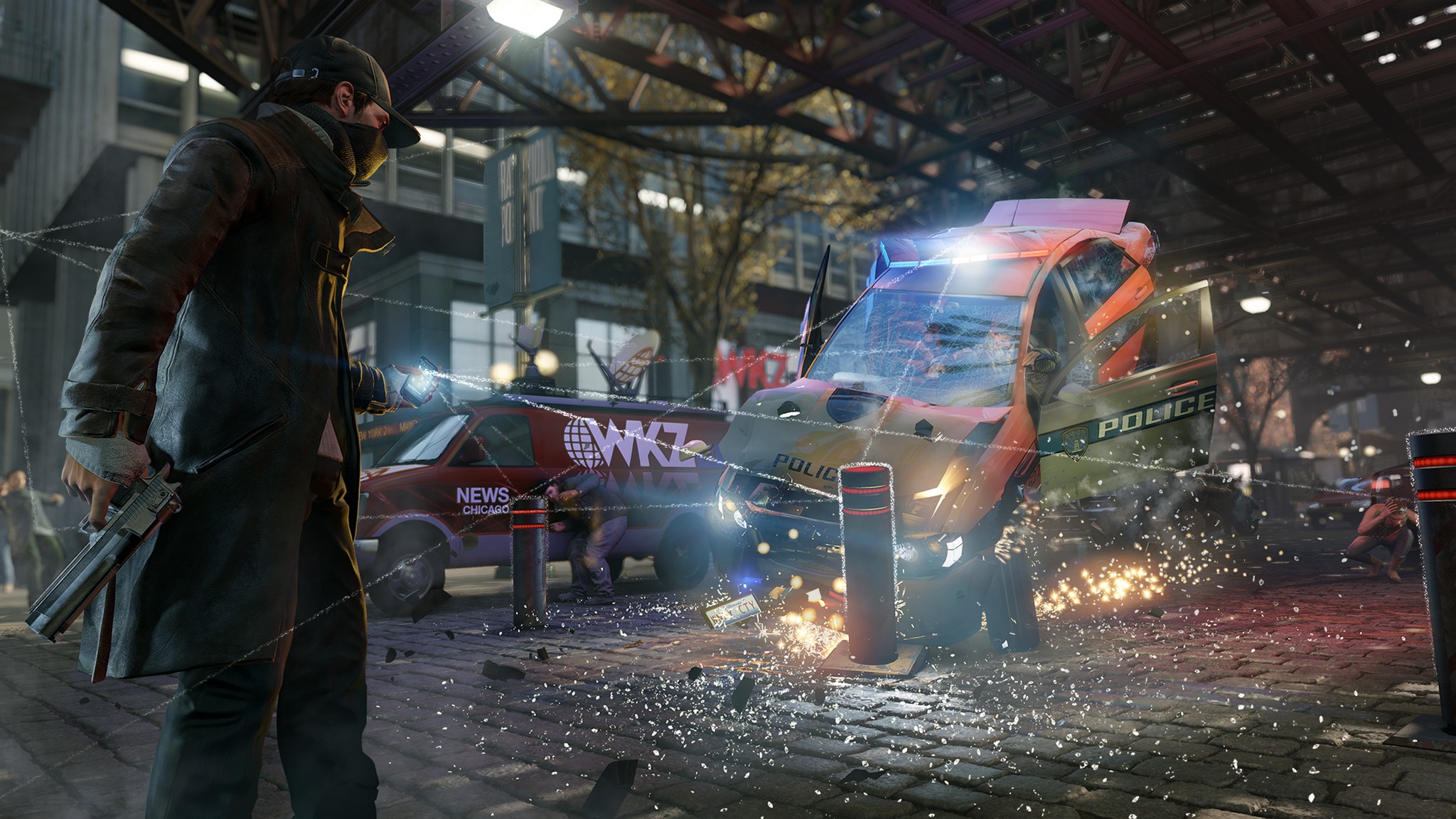 In the wide-open cityscape of Chicago, Aiden has access to various forms of urban infrastructure, as long as he has invested the prerequisite skill points into the relevant areas of expertise. The player can manipulate traffic signals and raise bridges to shake off vehicular pursuit, or cause explosions from gas pipes and pressure vents which can be useful during a firefight. At higher levels, Aiden can even cause district-wide blackouts by disrupting the city’s power grid, allowing him to literally vanish into the darkness.
In the wide-open cityscape of Chicago, Aiden has access to various forms of urban infrastructure, as long as he has invested the prerequisite skill points into the relevant areas of expertise. The player can manipulate traffic signals and raise bridges to shake off vehicular pursuit, or cause explosions from gas pipes and pressure vents which can be useful during a firefight. At higher levels, Aiden can even cause district-wide blackouts by disrupting the city’s power grid, allowing him to literally vanish into the darkness.
While these abilities are useful on a purely situational basis, it’s always good to have them in your back pocket and ready to whip out at a moment’s notice. They do inject some much needed variety into general gameplay, which is otherwise extremely uninspired and derivative. We’ve already had our fill of gun battles and police chases in countless other games, so I do appreciate that WATCH_DOGS offers some novel ways of tackling these scenarios that we are all too familiar with by now.
The much talked-about Profiler is the voyeur’s wet dream. Linked to the ctOS system, Aiden basically has access to the dirty little secrets and bank accounts of everyone in Chicago. Take a leisurely stroll down a crowded street with phone in hand, and you’ll definitely come across some amusing individuals, all of whom have backgrounds randomly generated from a massive pool of occupations, income levels, and personality traits.
 Not to mention that the player will easily be several thousand dollars richer within mere minutes. This actually breaks the game to some degree, as money is way too easy to acquire. I had several hundred thousand dollars in my account within a couple of hours of playtime without even really trying. While this is far from sufficient to purchase every single item in WATCH_DOGS, it is more than enough to set Aiden up with enough good weapons, ammo, and equipment to last for the majority of the game.
Not to mention that the player will easily be several thousand dollars richer within mere minutes. This actually breaks the game to some degree, as money is way too easy to acquire. I had several hundred thousand dollars in my account within a couple of hours of playtime without even really trying. While this is far from sufficient to purchase every single item in WATCH_DOGS, it is more than enough to set Aiden up with enough good weapons, ammo, and equipment to last for the majority of the game.
The Profiler also allows the player to essentially listen in on conversations and text messages, and some side-missions and events are actually unlocked this way. It’s a nice touch that adds a healthy dose of personality to the citizens of Chicago, and strengthens the illusion of a living, breathing city where people have their own lives to lead, along with all the associated problems that come with it.
Sure, it’s all just window dressing if you think about it, and doesn’t add all that much in terms of gameplay, but it does beat the lifeless mobs of passerbys that dominate other games in the genre. It’s a step in the right direction and I would love to see how developers expand upon this concept.
 The best part about hacking is that it opens up some creative ways of accomplishing objectives. Since Aiden requires line-of-sight to hack into devices, tapping into security cameras and using them as remote vantage points to reach other inaccessible areas can allow for some truly ingenious methods of infiltration, turning traditional stealth gameplay on it’s head.
The best part about hacking is that it opens up some creative ways of accomplishing objectives. Since Aiden requires line-of-sight to hack into devices, tapping into security cameras and using them as remote vantage points to reach other inaccessible areas can allow for some truly ingenious methods of infiltration, turning traditional stealth gameplay on it’s head.
In that sense, some missions are essentially one big game of virtual connect-the-dots in three dimensions. Sam Fisher and Solid Snake could definitely learn a thing or two here. Hacking into a server and retrieving the objective from half a mile away, while never actually stepping foot into the enemy compound by leapfrogging from camera to camera is certainly something I have never experienced in any other game to date.
When the hacking works the way it should, it really ignites a spark that makes the player think: “Yes, this really is something different”. Sadly, moments of brilliance like these just don’t happen often enough, and they are frequently relegated by the wayside in favor of…
Guns. Lots of Guns.
WATCH_DOGS has more available firearms than some pure shooter games out there. Let that sink in for a bit.
 That identity crisis rears it’s ugly head again. For a game that is supposed to be all about hacking, it certainly encourages the player to go in all-guns-blazing way too often. It says something that a direct, head-on assault often yields better and quicker results compared to what is supposed to be the central mechanic of the game.
That identity crisis rears it’s ugly head again. For a game that is supposed to be all about hacking, it certainly encourages the player to go in all-guns-blazing way too often. It says something that a direct, head-on assault often yields better and quicker results compared to what is supposed to be the central mechanic of the game.
As a 3rd-person shooter, WATCH_DOGS is adequate. It certainly lacks the polish and intricacy of titles like Gears of War, but the cover mechanics are sufficiently functional and intuitive, and the gunplay is surprisingly satisfying. Weapons run the usual gamut of categories, from handguns to assault rifles, shotguns, sniper rifles, and even grenade launchers.
With so many weapons available to the player, I was concerned that most of them would be carbon copies of each other. Fortunately, the various guns are distinct enough from each other in terms of power, precision, and tactile feedback, and the sheer variety of available options should complement just about any playstyle out there.
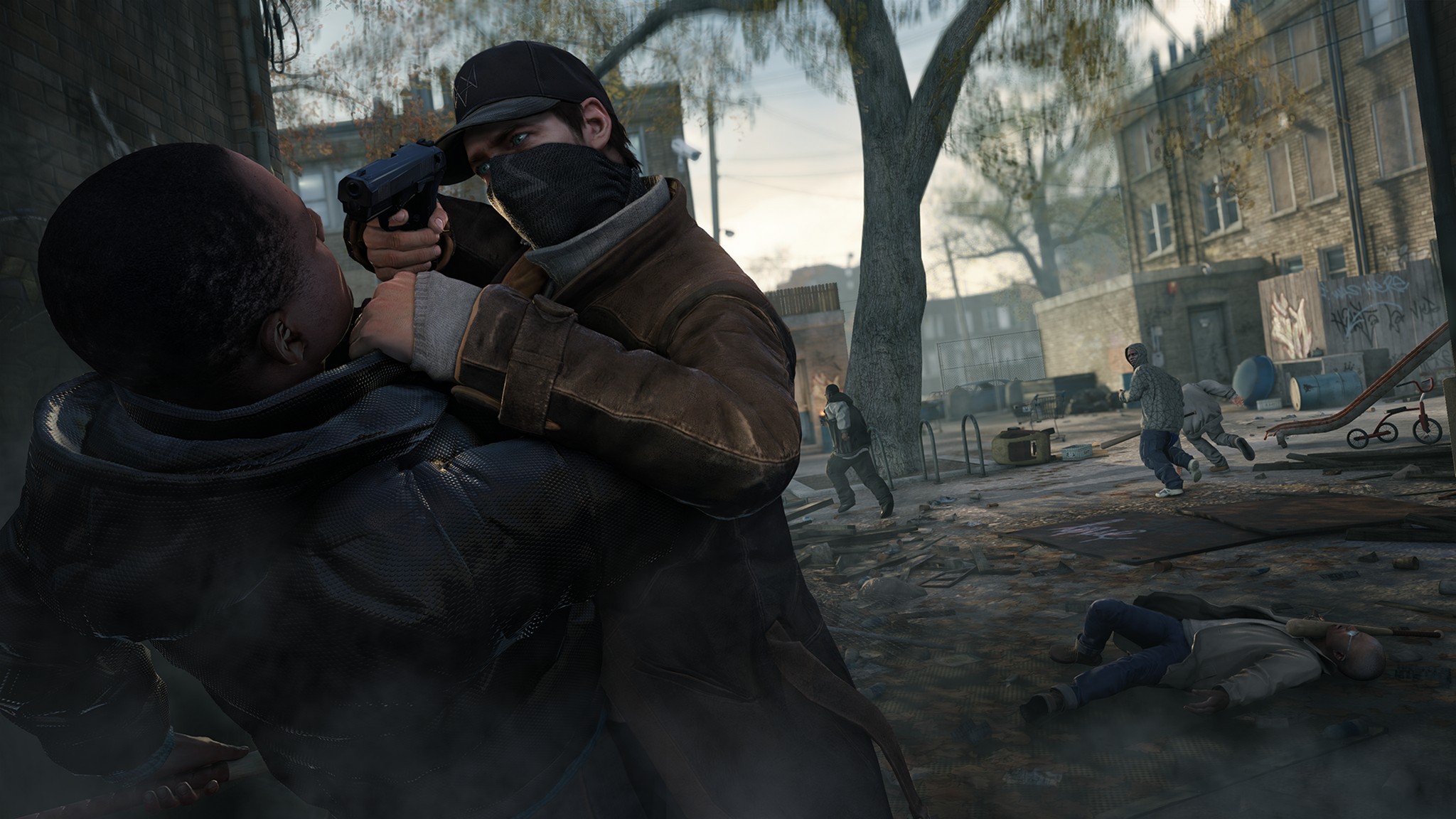 Since hostile forces will almost always have the numerical advantage on Aiden, and hackable devices may not always be present, players will want to even the odds any way they can. During a firefight, Aiden can enter a heightened state called Focus, which is essentially the classic slo-mo mechanic found in many shooters.
Since hostile forces will almost always have the numerical advantage on Aiden, and hackable devices may not always be present, players will want to even the odds any way they can. During a firefight, Aiden can enter a heightened state called Focus, which is essentially the classic slo-mo mechanic found in many shooters.
Despite his apparent badassery, Aiden can’t take much damage at all, so Focus serves to level the playing field by giving the player more time to line up those headshots for some quick kills. It’s not the most elegant solution, but popping heads with a revolver in bullet-time frankly never gets old.
Enemy AI is extremely inconsistent, ranging from competent to downright abysmal at times. You will occasionally see enemy combatants attempt to flank Aiden under cover fire from their comrades and reposition themselves in response to Aiden’s movements, but on the flip side, you sometimes see stuff like this:
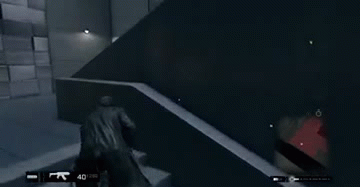
The Stig Would Not Be Pleased
Like in most other open-world games in an urban setting, you will spend a considerable amount of time on the road. Unfortunately, driving is unquestionably the worst part of WATCH_DOGS, so much so that I’m devoting an entire section to it.
 I fail to grasp why developers continue to force their take on “realistic” (and I use the term very loosely) driving mechanics on players when it is completely unnecessary. If done well, no one really takes notice, because let’s face it, this isn’t Gran Turismo or Forza Motorsport. If implemented poorly, which is the case more often than not, it completely detracts from the experience.
I fail to grasp why developers continue to force their take on “realistic” (and I use the term very loosely) driving mechanics on players when it is completely unnecessary. If done well, no one really takes notice, because let’s face it, this isn’t Gran Turismo or Forza Motorsport. If implemented poorly, which is the case more often than not, it completely detracts from the experience.
The driving mechanics in WATCH_DOGS fall firmly in the latter category. Vehicles behave as if they have a turning radius of about 12 miles, and even a supposedly high-performance sports car handles like a dump truck with a busted transmissiom. The almost complete lack of maneuverability in high-speed situations is aggravated by the fact that the game throws pursuit scenarios at the player very frequently.
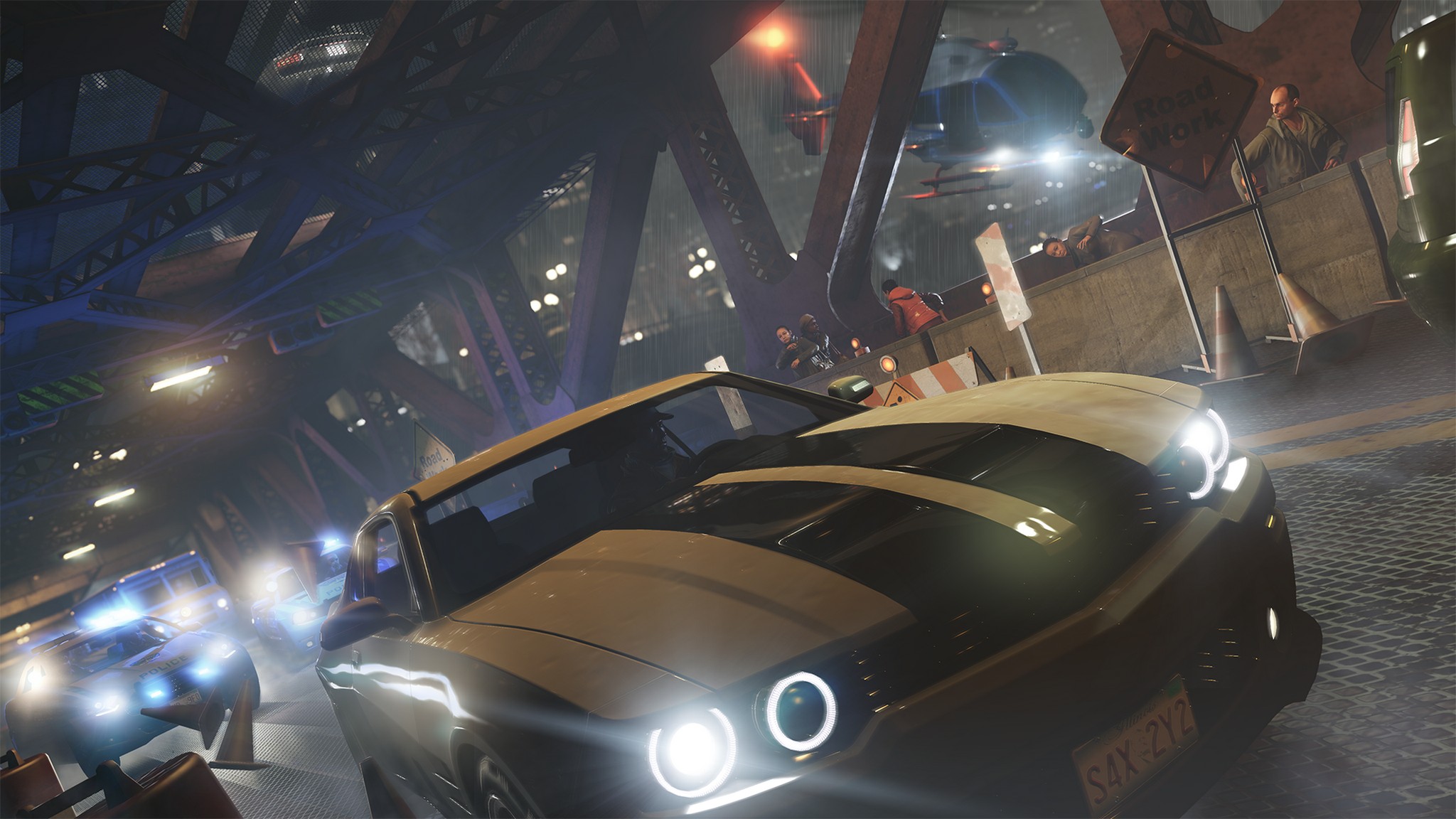 All too often, I find myself having to wrestle with my own vehicle while 2 or 3 AI drivers are bearing down on me unerringly like heat-seeking missiles. While I didn’t keep an actual count, I can safely say for sure that the vast majority of the times I had to stare at a loading screen was due to failing a driving sequence. It happened often enough that I soon learned to avoid side-missions that might require any form of aggressive driving entirely.
All too often, I find myself having to wrestle with my own vehicle while 2 or 3 AI drivers are bearing down on me unerringly like heat-seeking missiles. While I didn’t keep an actual count, I can safely say for sure that the vast majority of the times I had to stare at a loading screen was due to failing a driving sequence. It happened often enough that I soon learned to avoid side-missions that might require any form of aggressive driving entirely.
I appreciate complexity that enhances a game, but some frivolous additions only bring about additional frustration for the player. Why not just keep things simple and stick to arcade driving mechanics ala Burnout? I’m not saying that cars should be able to pivot on a dime and go 0-100 in 2 seconds flat, but when you risk spinning out and causing thousands of dollars worth of property damage every time you make a turn at an intersection, perhaps some fine-tuning is in order.
The Final Verdict
WATCH_DOGS barely gets a pass for being a (mostly) technically-sound game. It could have been the first true next-gen AAA experience, but ultimately falls short of the lofty expectations placed upon it after that stunning teaser Ubisoft showed off back in 2012.
Instead, we get a lifeless, painfully average product that criminally underutilizes a fascinating premise. One can’t help but wonder if WATCH_DOGS would have been better as a next-gen-only title, though at this point, any such claim would be perceived as nothing more than a convenient excuse for the game’s lackluster quality.
GEEK REVIEW SCORE
Summary
WATCH_DOGS is a run-of-the-mill, by-the-numbers open-world adventure masquerading as something more than the sum of it’s parts. The game never truly delivers on it’s promises of greatness and fizzles out in unspectacular fashion by the end of it’s 15-20 hours. Much like the first Assassin’s Creed, WATCH_DOGS serves as a better proof-of-concept than an actual game. Maybe Ubisoft can pull off an Assassin’s Creed II and address all of WATCH_DOGS’ problems in the inevitable sequel, but I won’t hold my breath for it.
Overall
5.5/10-
Gameplay - 5/10
5/10
-
Story - 4/10
4/10
-
Presentation - 6/10
6/10
-
Value - 7/10
7/10
User Review
( votes)Brian loves video games, gadgets, and comic books – in other words, all things geeky. Obsessed with lifting things up and putting them down repeatedly, he also loves ice cream, putting things together, and the occasional good book.

